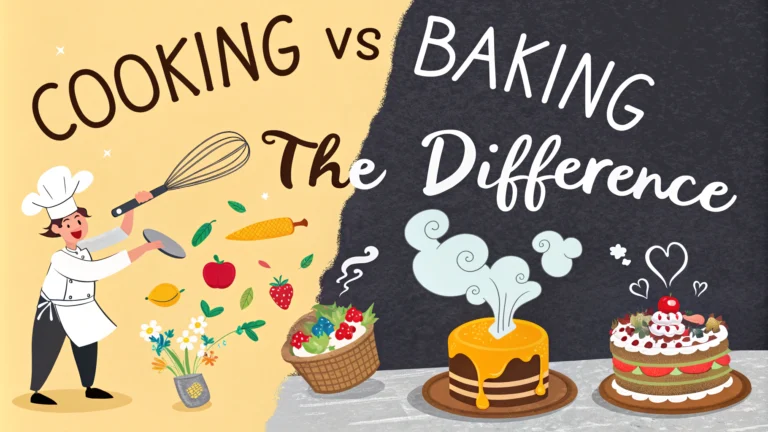While both involve transforming raw ingredients into delicious dishes, **cooking** and **baking** represent two distinct approaches to food preparation. A cook might confidently adjust seasonings mid-recipe, while a baker follows precise measurements to achieve consistent results.
Understanding these fundamental differences helps kitchen enthusiasts master both crafts and choose the right approach for different culinary projects. Let’s explore the key distinctions between these complementary kitchen skills.
Science vs Creativity: Core Differences
**Baking** operates as a precise science requiring exact measurements and temperatures. **Cooking** allows more room for experimentation and adjusting flavors on the fly.
- Baking: Requires precise ratios and chemical reactions
- Cooking: Embraces flexibility and taste adjustments
- Temperature control: Critical in baking, more forgiving in cooking
- Ingredient substitutions: Limited in baking, flexible in cooking
Essential Tools and Equipment
Each discipline demands specific tools for optimal results.
| Baking Essentials | Cooking Essentials |
|---|---|
| Measuring cups/spoons | Sharp knives |
| Kitchen scale | Cutting boards |
| Mixing bowls | Pots and pans |
| Baking sheets | Cooking utensils |
Temperature and Timing Considerations
**Temperature control** plays different roles in each discipline. Baking requires precise oven temperatures and timing, while cooking often relies on visual and tactile cues.
- Baking: Exact temperatures crucial for chemical reactions
- Cooking: Heat adjustments based on observation and experience
- Timing: Fixed in baking, flexible in cooking
Ingredient Selection and Storage Best Practices
The success of both cooking and baking relies heavily on the quality and freshness of ingredients. **Fresh produce** and **high-quality staples** make a noticeable difference in the final results.
- Store dry ingredients in airtight containers away from heat and light
- Keep refrigerated items at proper temperatures
- Check expiration dates on leavening agents like baking powder
- Organize ingredients by frequency of use
Troubleshooting Common Kitchen Challenges
Understanding how to fix common issues saves time and ingredients. **Quick fixes** and **prevention techniques** help maintain consistent results.
| Issue | Solution |
|---|---|
| Tough baked goods | Avoid overmixing |
| Burned food | Use timer, adjust heat |
| Uneven cooking | Rotate pans, check equipment |
| Bland flavors | Layer seasonings, taste test |
Building Your Kitchen Skills
Start with simple recipes and gradually increase complexity. Focus on mastering basic **techniques** before trying advanced projects.
- Practice knife skills regularly
- Learn to read recipes thoroughly
- Master temperature control
- Document successful modifications
Combining Both Skills for Better Results
Understanding both cooking and baking creates a well-rounded kitchen skill set. Apply **precision** from baking to improve cooking consistency, while using cooking’s **flexibility** to experiment with baked goods.
“The best home chefs understand when to follow rules strictly and when to trust their instincts.”
Keep a kitchen journal to track successes and learning opportunities. Join cooking communities to share experiences and gather new ideas.
- Blend techniques from both disciplines
- Use measuring tools when needed
- Trust your senses and experience
- Stay open to learning new methods
Cooking vs Baking FAQs
Basic Differences FAQ
Q: What is the main difference between cooking and baking?
A: Cooking is a flexible art that allows for ingredient adjustments during the process, while baking is a precise science requiring exact measurements and temperatures to achieve successful chemical reactions.
Q: Can you adjust ingredients while cooking and baking?
A: In cooking, you can adjust seasonings, ingredients, and heat levels throughout the process. In baking, ingredients must be precisely measured before starting, with little room for adjustment once mixed.
Q: Why is baking called a science?
A: Baking involves specific chemical reactions between ingredients like:
- Leavening agents (yeast, baking powder)
- Proteins (gluten formation)
- Starches (gelatinization)
- Sugars (caramelization)
Technical Questions
Q: What temperature control differences exist between cooking and baking?
A: Baking requires precise temperature settings (usually 300-450°F) maintained throughout the process, while cooking often uses variable temperatures and can involve multiple heating methods.
Q: Which kitchen tools are specific to baking vs cooking?
A:
| Baking Tools | Cooking Tools |
|---|---|
| Measuring cups/spoons | Spatulas/tongs |
| Kitchen scale | Wooden spoons |
| Pastry brush | Wok/skillet |
| Rolling pin | Cutting board |
Skill-Related Questions
Q: Is baking harder than cooking for beginners?
A: Baking can be more challenging for beginners due to its precise nature, but following recipes exactly usually guarantees success. Cooking allows more room for error and experimentation.
Q: What skills transfer between cooking and baking?
A: Common transferable skills include:
- Kitchen safety awareness
- Ingredient knowledge
- Time management
- Equipment handling
- Temperature control
Specific Technique Questions
Q: Why do baking recipes list ingredients by weight?
A: Weight measurements provide more accuracy than volume measurements, ensuring consistent results in baking where precise ratios are crucial.
Q: How does altitude affect baking vs cooking?
A: Baking requires significant adjustments at high altitudes due to lower air pressure affecting leavening and moisture evaporation. Cooking typically needs minimal altitude adjustments.
Q: Which method uses more precise timing – cooking or baking?
A: Baking requires more precise timing as chemical reactions occur at specific stages. Cooking timing is often more flexible and can be adjusted based on visual cues.
Q: What role does moisture play in baking vs cooking?
A: In baking, moisture content is precisely calculated and affects texture and structure. In cooking, moisture can usually be adjusted during the process without affecting the final result significantly.
Q: Can cooking recipes be doubled easily compared to baking recipes?
A: Cooking recipes can typically be doubled without issues. Baking recipes often need complex adjustments when scaling up due to chemical reactions and baking times.



















